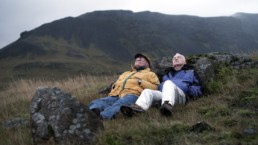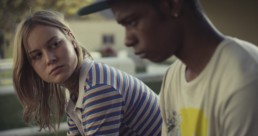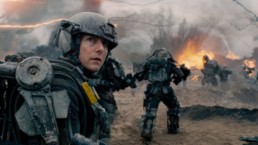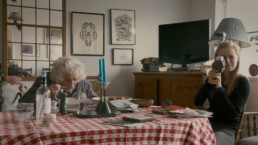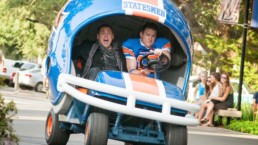Review: 'Land Ho!'
One of the major breakouts this year at Sundance to receive a prominent distribution, Land Ho! follows two retired friends and former brothers-in-law on a road trip around scenic Iceland. As far as plot goes, that’s about all you need to know. It’s a buddy comedy, a road trip movie, and a travelogue, all wrapped into one unconventionally simple product.
We’re introduced to our two characters, Mitch and Colin (Earl Lynn Nelson and Paul Eenhoorn respectively), as clear opposites: Mitch is the loud, raunchy Southerner, and Colin is the quiet, reserved Australian. The first third of the movie is brutally slow. For some reason, primarily due to the pacing and lack of immediate presence, it takes an unusual amount of time for us to adjust to the characters and also for them to really get going. Because this movie isn’t a laugh-out-loud comedy, there is an adjustment time to enjoy the tone that the movie takes, which doesn’t click until about a third of the way through. I initially feared that, like a similar film called The Trip, the two characters' banter would reach tedium. It does take our protagonists a long time to really get going, and the introduction of two side characters (played by Elizabeth McKee and Karrie Crouse) doesn’t feel as natural as the movie intends.
Fortunately, after about 30 minutes when the film has established itself, the movie becomes bliss. Watching characters that we now feel we have a good sense of taking on some of the most spectacular scenery is a simple delight. Mitch and Colin might be two old men, but their interactions are reminiscent of any experience with a good friend, a natural blend of playful and serious.
Most often, movies get off to a great start and then find themselves fizzling toward the end because they don’t know how to build off the concept; Land Ho! has the opposite issue.
Of course, the real delight of the film is seeing the wonderful country of Iceland: I would be hard pressed to find someone who could watch this movie and not want to take the same trip. It’s a natural wonder full of prehistoric looking mountains, black sandy beaches, and magnificent glaciers. Water plays a prominent visual role throughout the film, and there is no shortage here. The film does great justice to the beautiful water-locked country as somewhere wholly unique to take a journey.
The soundtrack is a modern 80’s homage with a few lyrical delights. There are times where its juxtaposition is a little jarring and could use a smoother transition, but as a score, it ends up being the perfect backdrop to the gorgeous Icelandic scenery.
Most often, movies get off to a great start and then find themselves fizzling toward the end because they don’t know how to build off the concept; Land Ho! has the opposite issue. Because the premise is so simple, it takes a longer nudge to get the ball rolling. But once it does, the film feels comfortable and satisfying to watch unravel until the very last shot. It’s a rare case where it actually ends with you wanting more, but like any seasoned traveler, Land Ho! does not overstay its welcome. It recognizes the scale of the project and seeks nothing more than to provide a charming and fun trip for an audience to join in on, of which I was more than happy to oblige.
https://www.youtube.com/watch?v=VOrALE_pBxU
Review: 'Short Term 12'
Watch the first five minutes of Short Term 12, at least until the title comes up, you will without a doubt you be hooked on watching the remainder of this indie drama that came out last summer. The title comes from the film’s setting, a transitional home for kids of all ages between foster homes. At the center of the story is Grace (Brie Larson), one of the more experienced caretakers who has seen it all when it comes to taking care of kids, as well as her fiancée Mason (John Gallagher Jr.). Over the course of the film, we learn more about their relationship, their history, as well as the numerous stories and backgrounds of the kids that they mentor.
What makes the film so captivating is that it’s an exposure to a culture within the United States that most audiences would never see otherwise, but for people who have experienced it directly it is their entire livelihood. Without saying too much, a lot of character development digs into Grace’s past, and there is a heavy irony in her being the kids' biggest support system, as she is just as emotionally scarred as them. It would be challenging to find more moving sequences of drama than scenes where Grace supports the various teens of the center, each one given their own tactic. It is also an exposé on a broken system, and it should come as no surprise that the foster care program in the US has a long way to go, but it’s the people within it who are making the difference.
It is also an exposé on a broken system, and it should come as no surprise that the foster care program in the US has a long way to go, but it’s the people within it who are making the difference.
There are two teen characters who are given the most focus: Jayden (Kaitlyn Dever) and Marcus (Lakeith Lee Stanfield). Both actors are given such quality material to work with and they both take it to new heights. There is no melodrama here: the problems they deal with are real and the movie succeeds in showing how these characters handle situations in a way that doesn’t feel contrived.
There are a few characters who aren’t as well developed. Nate (Rami Malek), the new foster mentor, is a character with the sole purpose of being the link that the audience can relate with. But in more than a few situations, his naïveté with how to handle situations is over-the-top. An inexperienced but more restrained character would create less suspension of disbelief. Regardless, it’s a minor complaint considering the emotional prowess of the rest of the film.
Made for less than a million dollars, Short Term 12 did not get the wide release it should have, only playing in a few cities. However, now that it is streamable on Netflix, there is potential for it to reach much wider audiences, all of whom will be able to connect with the intimate drama in the comfort of their own home. There are challenging parts of this film, but like any good drama, the process is rewarding. I didn’t get to see this movie until recently, but I am certainly glad I was finally able to: it is certainly one of the best movies from last year.
https://www.youtube.com/watch?v=qhS6tvSb0UQ
Review: 'Dawn of the Planet of the Apes'
Set 10 years after the 2011 reboot Rise of the Planet of the Apes, this year’s installment, Dawn of the Planet of the Apes, features the same cast of ape characters led by Caesar (Andy Serkis) matching up against an entirely new human cast featuring Jason Clarke, Keri Russell, and Gary Oldman in primary roles. Between the events of the first movie and Dawn, a virus has wiped out most of humanity, leaving the last survivors in San Francisco. Simultaneously, Caesar and the apes have prospered in creating a massive new colony. The drama ensues when the humans stumble upon the ape settlement, and it's inevitable that their tension leads to conflict and battle.
Despite a different look and new dystopian future setting, structurally, this film is quite similar to the last one, and in this case, that’s actually a high compliment. Both movies are advertised worldwide as spectacle action movies, yet the majority of the film is tense, brooding drama between protagonists, and larger metaphors about conflict between species. This is all thanks to how much emotional range is given to the apes, who have never looked more life-like thanks to some of the best visual effects created to date. These stories have given so much room to Andy Serkis, whose contribution to cinema have been astounding us ever since he gave life to Gollum in The Lord of the Rings. As Ceasar this time around, he is a peaceful, contemplative warrior caught between loyalties to various individuals, and is given a rival in the form of Koba (Toby Kebell), who is more war-mongering and human-hating than Caesar. The drama that unfolds ends up being more dynamic than a lot of the action, even though that is still engaging. It’s arguable that Caesar is the most emotionally realized CGI character in the history of film.
It’s arguable that Caesar is the most emotionally realized CGI character in the history of film.
The irony in having so much quality development in the protagonists is that, like Rise before it, the antagonists are all irrationally evil to an absurd degree. It gets to the point where characters take actions that are ludicrous just because they are so committed to being evil. For future installments, I want to see the character development of the villains reach the pristine levels of the heroes of the franchise.
Not only are the visual effects seamless and captivating, the camera work here from Michael Seresin is top-notch, with a handful of shots that are truly jaw-dropping. The greatest shots can tell a story with a single image, and scattered throughout this movie there are more than a handful of shots that speak volumes of mood and plot.
Given that these are meant to be prequels leading to the actual Planet of the Apes, there is a certain inevitability that comes with this whole franchise. It appeared from trailers that this movie would more swiftly move the action toward that storyline, and midway through the film, the writing appears to be on the wall for what will come of humans and apes. But through a turn of events, it’s clear that there will be a much longer string of movies before we see full ape takeover. That means that the value of this episode’s story depends on what happens in the next sequel (due in 2016), but the film only increases curiosity as to what will happen next. Regardless, Dawn continues this series as one of the most unique blockbusters of recent memory, and one with much more emotion and intrigue than ever expected, boding well for the future of the Apes saga.
https://www.youtube.com/watch?v=3sHMCRaS3ao
Review: 'Edge of Tomorrow'
An alien invasion has left Europe overrun with a parasitic, violent alien species that is quickly taking over the world. Major William Cage (Tom Cruise), an American who has recruited millions of soldiers to their death, yet has never fought a day in his life, is forcibly placed on a suicide mission on the front line in France. On his first day in combat, a suicide beach raid reminiscent of Normandy, he is killed…only to wake up the day before, stuck reliving the same day and dying in combat over and over again, essentially a sci-fi action Groundhog Day.
The last time Tom Cruise graced the screen, he was seen similarly playing in high concept sci-fi with Oblivion, a beautifully imagined but otherwise dull project. With that in mind, fatigue set low expectations for his next passion project. Expectations could not be more wrong, and once the movie begins, it delivers a spectacular action movie far better than marketing or even the premise would suggest. While Cruise has had a mixed track record as of late, he’s right on point here, fitting into the role of a cocky military official turned hardened warrior like a glove. Unlike Oblivion’s drab mood, here there is room for comedy, with some great laughs mixed amongst the intense action battles. The pivotal beach storm which our protagonist is forced to keep re-living is intense and fully realized, like a sci-fi homage to Saving Private Ryan, only much more fun to watch: if someone creates an Edge of Tomorrow theme park ride, sign me up for the first ride.
The pivotal beach storm which our protagonist is forced to keep re-living is intense and fully realized, like a sci-fi homage to Saving Private Ryan, only much more fun to watch: if someone creates an Edge of Tomorrow theme park ride, sign me up for the first ride.
The plot gets underway thanks to Rita (Emily Blunt), the propaganda soldier who becomes the only person to believe what Cage is saying since she also experienced the same phenomenon. Unlike Groundhog Day, which leaves the repeating day phenomenon a poetic mystery, here the reason behind it is revealed and has to be used properly if there’s to be hope of stopping the aliens. Unlike Cruise who has been a fixture as a leading man for thirty years, Emily Blunt has yet to have a real chance to stand out, and in this movie we see that she has all the chops worthy of a lead actress: she’s smart, tough, and can stand for himself. Of course, the movie is primarily a showcase for Cruise, but Blunt has made a great case to get movies of her own in the future.
Once their mission gets underway, it’s a completely fun ride to the finish, balancing the mystery of how it will conclude with some quality action and comedy. Some of the most fun comes from Cruise figuring out how to utilize the fact that he is re-living the same day. Anyone who has seen Groundhog Day can guess how that plays out, but because the genre is so far removed, Cruise holds his own as something that feels completely fresh. The words “intelligent” and “serious” blockbusters are usually interchangeable, but thanks to a great script, here the intelligence of the story doesn’t mean the audience can’t enjoy the ride.
Director Doug Limon (The Bourne Identity, Mr. and Mrs. Smith) has been making action movies for the last decade to mixed results. However, with this project, it finally feels like he has realized how to match the excitement of his earliest work with sci-fi action. While it might not seem like much of a success given its so-so box office returns, Edge of Tomorrow proves to be a fully entertaining spectacle that firmly keeps Tom Cruise at movie star status.
https://www.youtube.com/watch?v=yUmSVcttXnI
Review: 'Stories We Tell'
Stories We Tell is a documentary revolving around the family of Canadian director Sarah Polley, who, as we learn over the film’s runtime, had quite the tumultuous past. Through a series of interviews and archive footage, she weaves together an intimate story in which everyone involved tells their version of her family’s story. The central focus here is Polley’s late mother, whose wild ways would leave an impact on everyone she encountered, but none more than the director herself.
It’s clear from the early interviews that we’re leading up to some sort of twist, and that’s true, but the twist is just the beginning of an even larger storyline. I am intentionally vague on the events that happen because like any great film, the less you know going in, the more rewarding the viewing experience will be.
There are multiple engrossing interviewees, but at the center of all this is Michael, Polley’s father, who is not only interviewed but is shown reading a version of this story that he had written shortly after the key events. Through his storytelling, we capture a narration, a script that keeps the movie flowing. Through his interview, we see him humanized, a parallel commentary.
Polley reminds us that the oldest trick in filmmaking, juxtaposition, is still one of the best.
Polley reminds us that the oldest trick in filmmaking, juxtaposition, is still one of the best. If you show an image, it has no meaning. But if you show an image with context, it can drop an emotional bomb on the audience. When we first see the opening shot, it’s just a beautifully composed car passenger’s point of view of telephone wires along a winter road. Anyone has sat in a car and watched the world pass by. But when it is revealed what that shot represents, one all-important car ride, it carries massive emotional weight.
Is this opening shot actual footage from that very moment? Nope. Does it matter? In this case, not at all: this is what many modern documentaries are realizing. It’s by no means dishonest to use staged imagery to enhance the film’s realism and thematic feeling. That concept plays a larger role in the latter half of the film.
I’ve spoken predominantly about the engrossing story that is told here, but the style is so crucial toward why the film works. Before the interviews start we see the behind-the-scenes, as all of the staged interviews are set up, rarely shown in a film. Polley does everything she can to make it translucent that this is a film, the people she’s showing are telling their real stories and exposes everything that could seem staged. Not all of the stories line up – all the relatives have their own version – but Polley nonetheless succeeds displaying they’re all telling the truth.
By the end of the film, we know a lot about Sarah Polley, who started out as a young actress in movies such as Go and the Dawn of the Dead remake, and by growing up in a cinematic world has developed a natural eye for film and performance. Her first two directing projects, Away from Her (2006) and Take this Waltz (2012) showed emotional grace and potential to connect to audiences. Stories We Tell is one of the most personal films that has ever been made. As is the case with quality specific work, it is, therefore, more universal due to its authenticity. This documentary is now available to watch on Netflix.
'Streamable Sundays' highlights the abundance of films available now to stream on Netflix and other online platforms. Every Sunday, contributor Nelson Tracey will spotlight a new film that you can watch today– for suggestions feel free to email him at trace102@mail.chapman.edu.
https://www.youtube.com/watch?v=A_8BnZ471GY
Review: '22 Jump Street'
Considering its been just over two years since the first outing, (21 Jump Street) the careers of Jonah Hill and Channing Tatum, have risen immensely from young actors to A-list stars. While this movie may take place just after the first, our actors are strides beyond where we first found them.
Like many sequels, 22 Jump Street promises a bigger, badder, version of what came before: in this case, college. And yes, every college movie touchstone is brought to light here: fraternity parties, football games, regrettable hookups, self-absorbed professors, even a school shrink. In this environment, the two leads are able to grow a little more, and the sequel plays as a follow-up to the first without seeming utterly redundant. In this way, the college setting works more fluidly than the high school setting did because there are simply more shenanigans they find themselves in on a university campus.
Another major improvement this time around is the use of Ice Cube as Captain Dickson, the police chief. There isn’t much to remember about him from the first movie, but in the sequel, it’s possible he gets the biggest laugh, thanks to a perfectly executed comedic twist. While Hill and Tatum take up most of the screen, Ice Cube steals every moment he’s given.
It’s repetitive at times but for the most part is hilarious.
With that in mind, there are two big selling points on this movie that make it worth seeing. The first, as mentioned, is the dynamic between Hill and Tatum, where their characters Schmidt and Jenko are done with their honeymoon phase and are now learning how to stay friends and cops no matter what obstacles come at them. This is where the homoeroticism enters, and while for many buddy cop movies it never is unearthed, for this satire it is perhaps the driving force of the entire movie. Through all the college shenanigans, these guys just have to be together. It’s repetitive at times but for the most part is hilarious.
The second piece of the movie is that this time around the block, not only is it spoofing buddy cop movies (or 80’s TV), now we get the ultimate spoof of a big-budget sequel, starting from the opening credits until the very last shot. It’s got a lot of the same turning points as the first, but now is amplified with more characters and bigger events, including a huge spring break finish in Mexico (filmed in Puerto Rico). Never has a cash grab been as self-aware to recognize, and thereby embrace, exactly what it is. Directors Phil Lord and Christopher Miller have proven themselves to be the most modern comedy directors working today, switching back and forth from phenomenal animated family humor (The Lego Movie, Cloudy with a Chance of Meatballs) to the R-rated Jump Street series where they are fully aware that they’ve done way more with the material that anyone could’ve expected. Expect a multitude of jabs at the fact that this is a sequel.
At times it is a little repetitive, because even though it’s good material, it is familiar material. The movie leaves an open door for a 23 Jump Street to exist, but with the level of sequel spoofing that this film achieves, how much more could a third film bring without completely beating the life out of the series? This is the best possible sequel that could have come from 21, but promises even more exciting ventures for both Tatum and Hill's futures as actors.
http://youtu.be/v9S_dYuq0vE

